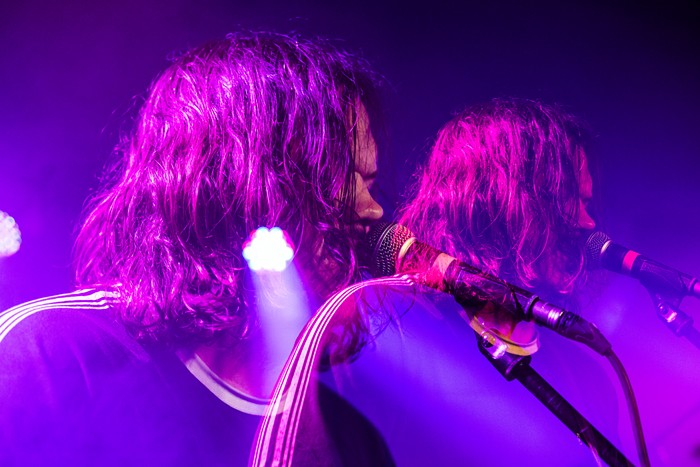"I think a lot of day-to-day life has been stripped of any mystical, fantastic value, so I like things that put a little bit of that depth back into it," explains Jesy Fortino, the solo artist who performs under the name Tiny Vipers. Her bleak acoustic epics are rich with such mysticism—haunting and spare, Fortino's voice sears plaintively over the phantom melodies of her guitar. In a musical landscape where singer/songwriter has become less a practice and more a bland aesthetic genre unto itself, it is rare to find a voice as distinct as Fortino's.
Since signing to Sub Pop in September, Fortino has been carefully crafting an album to be released in the spring of next year. Her upcoming performance at the Crocodile—a benefit show for labelmate Pat Spurgeon of Rogue Wave, who is in dire need of a kidney transplant—will be one of very few shows she plays over the course of the next few months, as Fortino is sequestering herself to record and revise demos for the new album, which will be engineered by Chris Common at Red Room Recording.
"I'm not looking much further than the record; I've got tunnel vision," she admits. "I just want to make the best record that I can. Even if nobody likes it, I want to make sure that it's exactly what I want it to be... Focusing on recording makes me feel 500 times better [than] the live stuff—I just don't enjoy playing live. I've always kind of been torn about that. Even when I first started, I hated playing shows and I'd flip out."
In live performances, Fortino's discomfort is evident; she seems to shrink onstage between songs. Bending her head down as she thanks the audience, shadows circle her eyes from the stage lights above. As she begins to pick and pluck the steel strings of her guitar, her voice opens up a landscape of sunken ships and hazy, paranoid wastelands in which she is both the hunter and the prey.
"I had just moved back [to Seattle] when I first started the Tiny Vipers thing, so I didn't have any friends and I was really uncomfortable. When I first started performing, I got the worst stage fright; I almost had to create this fictional persona to deal with it," states a self-conscious but warmly self-effacing Fortino. "Now I'm becoming more comfortable, so I think the music is becoming more honest.
"Performing can destroy you if you're not confident. Feeling confident is a good thing, [I'm] confident enough that I can go onstage and people can talk and I won't go and cry myself to sleep," she continues with a laugh.
For a performer who can appear so tense and uncomfortable onstage, the songs themselves are strident in their own unique identity, overtaking audiences with intensity and humility. Drawing upon influences as disparate as the Legendary Pink Dots, Biosphere, and Syd Barrett, Fortino paradoxically crafts rich landscapes out of austere minimalism.
"I like empty space—people-free areas like the woods, the desert. I just like being alone and I can't have that here... I listen to a lot of dry ambient music, soundscapes. Music that's too present can get on my nerves." (Appropriately enough, while she's saying this, the stereo at the coffee shop where we're conducting the interview is playing a cover of Styx's "Come Sail Away," bleated by South Park's Cartman.)
"It's kind of embarrassing but I really liked New Age music [growing up]. Like, my mom bought that Pure Moods CD—whatever was kind of trendy at the time my mom would get. We'd have Enya and that around so I listened to that for a long time... Eventually I got into more rock and roll, goth, industrial stuff. I liked Skinny Puppy a lot, Legendary Pink Dots... I went to a different school almost every year, so I never really had many friends, but I would totally try to fit in, so I would buy CDs of whatever I saw the kids wearing... I think that's what kind of substitutes for friendship when you're a teenager: music."


















